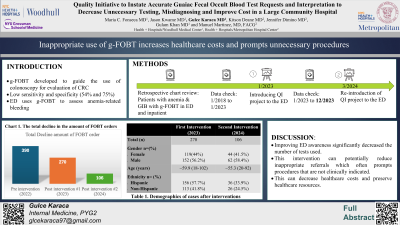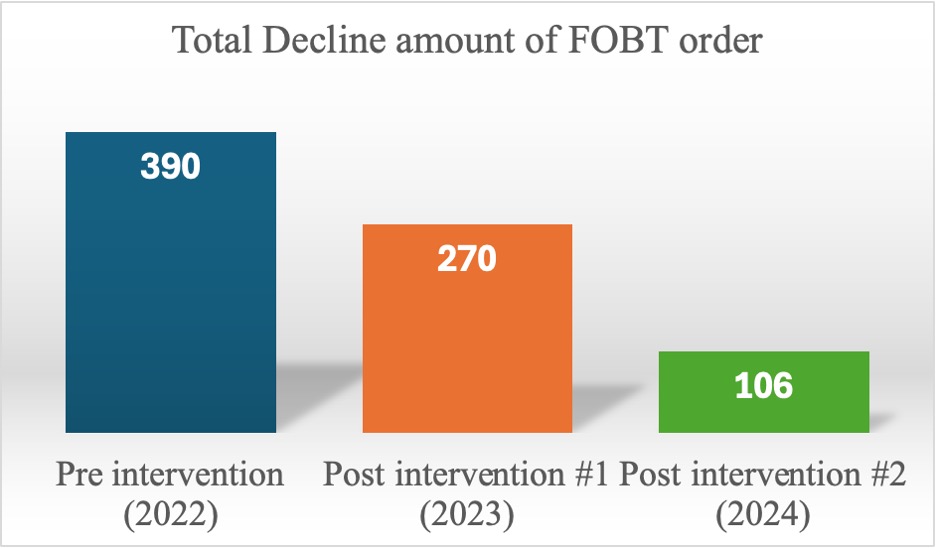Monday Poster Session
Category: GI Bleeding
P2445 - Quality Initiative to Instate Accurate Guaiac Fecal Occult Blood Test Requests and Interpretation to Decrease Unnecessary Testing, Misdiagnosing, and Improve Cost in a Large Community Hospital
Monday, October 28, 2024
10:30 AM - 4:00 PM ET
Location: Exhibit Hall E

Has Audio

Maria Camila Fonseca, MD
New York Health and Hospitals/Woodhull Hospital
Brooklyn, NY
Presenting Author(s)
Maria Camila Fonseca, MD1, Jason Kwame, MD1, Gulce Karaca, MD2, Badr ilmaguook, MD2, Kitson Dane, MD3, Jennifer Dimino, MD3, Gulam Khan, MD, MS2, Manuel Martinez, MD, FACG2
1New York Health and Hospitals/Woodhull Hospital, Brooklyn, NY; 2NYC Health + Hospitals/Woodhull, Brooklyn, NY; 3NYC Health + Hospitals/Metropolitan, Manhattan, NY
Introduction: The Guaiac Fecal Occult Blood Test(g-FOBT) was developed and validated as a tool to guide the use of colonoscopy for the evaluation of colorectal cancer(CRC). However, despite existing recommendations, many Emergency Departments(EDs) continue to employ it to assess anemia-related bleeding, potentially misattributing gastrointestinal bleeding as the source and subsequently pursuing endoscopic interventions. Currently, available data underscores the inappropriate use of g-FOBT in clinical settings; with a notable absence of studies assessing its impact and accuracy of diagnoses, especially within the diverse and underserved population of a large community center in Brooklyn, NY.
Methods: After approval by the Project Improvement meeting at Woodhull Hospital. We performed a retrospective review of patient charts, including patients with anemia and any gastrointestinal bleeding in whom g-FOBT was done in the ED and inpatient setting. The initial retrospective evaluation spanned from 1/ 2018-1/2023. Subsequently, the project was introduced to the ED, and in 12/2023, another retrospective review was undertaken to analyze post-intervention data, covering the period from 1/2023-12/2023. The percentage reduction was computed to quantify the impact of the intervention using SPPSS.
Results: A total of 390 patients with anemia and GIB had g-FOBT collected from 1/2022-12/2022. When evaluated by semester, there were 210 patients and 180 patients respectively. After the intervention(on 12/2023), 270 patients met the criteria, of those 147 patients were from the first semester and 121 for the second semester(Chart 1). When calculated, the percentage decrease at one year was 30.7%, during the first six months 30%, and for the following semester 32.7%. On 3/2024 a second intervention was done, demonstrating 63 cases prior and 44 after the intervention, with a total of 106. In terms of reduction, we noted a 33% decrease that year and a total of 88% decrease since 2022. The collection was noted to be 100% from ED. Demographics in Table 1.
Discussion: High rates of g-FOBT collection are done in the hospital setting; it is noteworthy that all were done in the ED. Improving ED awareness did significantly decrease the amount of g-FOTB. We propose that this intervention significantly reduced inappropriate referrals which often prompt procedures that are not clinically indicated and thus positively impacted healthcare costs and healthcare resources.

Note: The table for this abstract can be viewed in the ePoster Gallery section of the ACG 2024 ePoster Site or in The American Journal of Gastroenterology's abstract supplement issue, both of which will be available starting October 27, 2024.
Disclosures:
Maria Camila Fonseca, MD1, Jason Kwame, MD1, Gulce Karaca, MD2, Badr ilmaguook, MD2, Kitson Dane, MD3, Jennifer Dimino, MD3, Gulam Khan, MD, MS2, Manuel Martinez, MD, FACG2. P2445 - Quality Initiative to Instate Accurate Guaiac Fecal Occult Blood Test Requests and Interpretation to Decrease Unnecessary Testing, Misdiagnosing, and Improve Cost in a Large Community Hospital, ACG 2024 Annual Scientific Meeting Abstracts. Philadelphia, PA: American College of Gastroenterology.
1New York Health and Hospitals/Woodhull Hospital, Brooklyn, NY; 2NYC Health + Hospitals/Woodhull, Brooklyn, NY; 3NYC Health + Hospitals/Metropolitan, Manhattan, NY
Introduction: The Guaiac Fecal Occult Blood Test(g-FOBT) was developed and validated as a tool to guide the use of colonoscopy for the evaluation of colorectal cancer(CRC). However, despite existing recommendations, many Emergency Departments(EDs) continue to employ it to assess anemia-related bleeding, potentially misattributing gastrointestinal bleeding as the source and subsequently pursuing endoscopic interventions. Currently, available data underscores the inappropriate use of g-FOBT in clinical settings; with a notable absence of studies assessing its impact and accuracy of diagnoses, especially within the diverse and underserved population of a large community center in Brooklyn, NY.
Methods: After approval by the Project Improvement meeting at Woodhull Hospital. We performed a retrospective review of patient charts, including patients with anemia and any gastrointestinal bleeding in whom g-FOBT was done in the ED and inpatient setting. The initial retrospective evaluation spanned from 1/ 2018-1/2023. Subsequently, the project was introduced to the ED, and in 12/2023, another retrospective review was undertaken to analyze post-intervention data, covering the period from 1/2023-12/2023. The percentage reduction was computed to quantify the impact of the intervention using SPPSS.
Results: A total of 390 patients with anemia and GIB had g-FOBT collected from 1/2022-12/2022. When evaluated by semester, there were 210 patients and 180 patients respectively. After the intervention(on 12/2023), 270 patients met the criteria, of those 147 patients were from the first semester and 121 for the second semester(Chart 1). When calculated, the percentage decrease at one year was 30.7%, during the first six months 30%, and for the following semester 32.7%. On 3/2024 a second intervention was done, demonstrating 63 cases prior and 44 after the intervention, with a total of 106. In terms of reduction, we noted a 33% decrease that year and a total of 88% decrease since 2022. The collection was noted to be 100% from ED. Demographics in Table 1.
Discussion: High rates of g-FOBT collection are done in the hospital setting; it is noteworthy that all were done in the ED. Improving ED awareness did significantly decrease the amount of g-FOTB. We propose that this intervention significantly reduced inappropriate referrals which often prompt procedures that are not clinically indicated and thus positively impacted healthcare costs and healthcare resources.

Figure: Chart 1. The total decline in the amount of g-FOBT orders
Note: The table for this abstract can be viewed in the ePoster Gallery section of the ACG 2024 ePoster Site or in The American Journal of Gastroenterology's abstract supplement issue, both of which will be available starting October 27, 2024.
Disclosures:
Maria Camila Fonseca indicated no relevant financial relationships.
Jason Kwame indicated no relevant financial relationships.
Gulce Karaca indicated no relevant financial relationships.
Badr ilmaguook indicated no relevant financial relationships.
Kitson Dane indicated no relevant financial relationships.
Jennifer Dimino indicated no relevant financial relationships.
Gulam Khan indicated no relevant financial relationships.
Manuel Martinez indicated no relevant financial relationships.
Maria Camila Fonseca, MD1, Jason Kwame, MD1, Gulce Karaca, MD2, Badr ilmaguook, MD2, Kitson Dane, MD3, Jennifer Dimino, MD3, Gulam Khan, MD, MS2, Manuel Martinez, MD, FACG2. P2445 - Quality Initiative to Instate Accurate Guaiac Fecal Occult Blood Test Requests and Interpretation to Decrease Unnecessary Testing, Misdiagnosing, and Improve Cost in a Large Community Hospital, ACG 2024 Annual Scientific Meeting Abstracts. Philadelphia, PA: American College of Gastroenterology.
